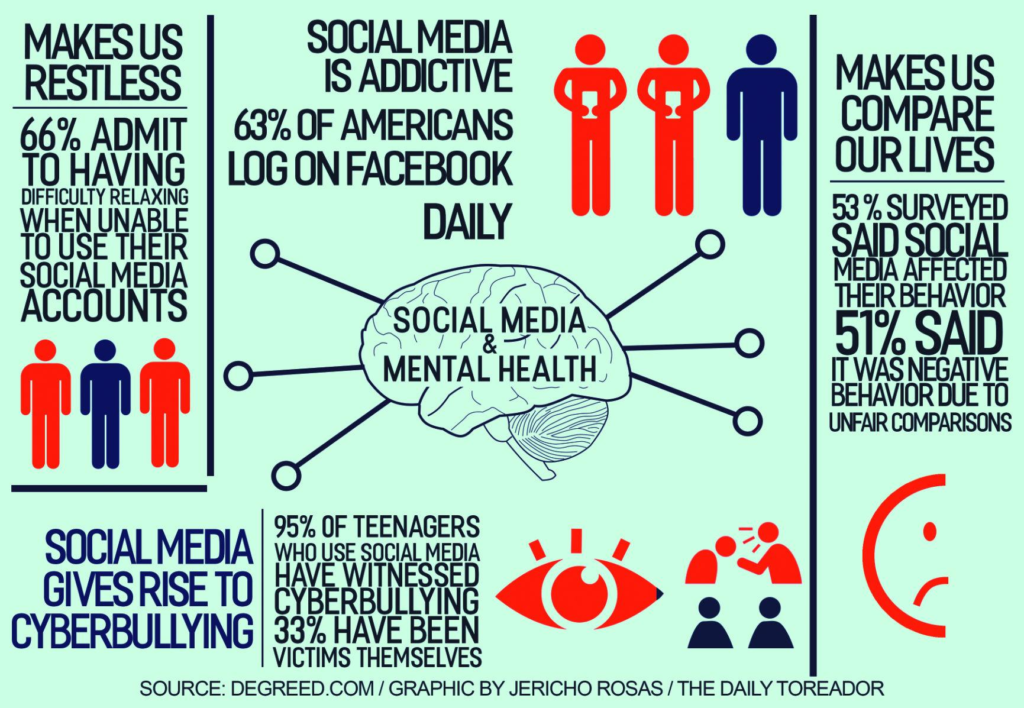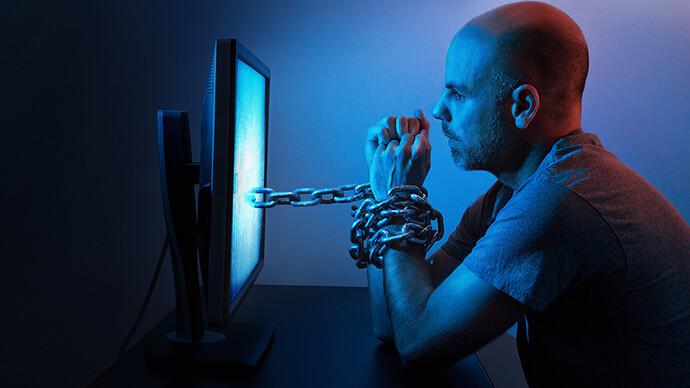The impact of excessive social media usage on men’s mental health
Social media has become an integral part of our lives, offering unprecedented connectivity and access to a vast digital world. While it has its benefits, there is growing concern about the detrimental effects of excessive social media use on mental health, particularly in men. The pressure to portray a perfect image, the addictive nature of scrolling, cyberbullying, and the link to social isolation all contribute to the negative impact on men’s well-being. In this article, we will explore these issues in detail, shedding light on the ways excessive social media usage is ruining men’s mental health and offering insights into strategies for finding balance in the digital age.
The prevalence of social media among men
Social media has become an integral part of modern life, and men are no exception to this digital trend. From scrolling through Instagram feeds to tweeting their thoughts, men are increasingly engaging with various social media platforms. However, the constant exposure to these virtual realms can have a significant impact on their mental health.
Understanding the connection between social media use and mental health
While social media offers a means of staying connected and entertained, its excessive usage can take a toll on men’s mental well-being. Research suggests that increased social media use is associated with higher levels of anxiety, depression, and poor self-esteem. Understanding this connection is crucial for recognizing the potential harm it can cause and taking necessary steps to protect mental health.

The pressure to portray the perfect image: Social media and unrealistic expectations
The culture of comparison on social media
One of the biggest challenges men face on social media is the relentless culture of comparison. Scrolling through carefully curated profiles and seeing others’ seemingly perfect lives can often lead to feelings of inadequacy and self-doubt. The constant pressure to measure up to these idealized standards can take a toll on their mental health, leading to anxiety and a distorted sense of self-worth.
The effects of constantly striving for validation
In the quest for validation and likes, men may find themselves seeking external approval on social media. This constant need for affirmation can be exhausting and damaging to their self-esteem. The pursuit of validation through social media can create a never-ending cycle of seeking approval, leaving men vulnerable to feelings of disappointment and worthlessness when they don’t receive the desired response.
The addictive nature of social media: How it affects men’s mental well-being
Understanding the dopamine-driven loop of social media use
Social media platforms are designed to be addictive, and men are not immune to their allure. Continuous scrolling, notification alerts, and the instant gratification of likes and comments release dopamine in the brain, creating a reward-driven loop. This addictive nature of social media can lead to excessive use, adversely affecting men’s mental well-being and overall productivity.
The negative impact of excessive screen time on mental health
Spending excessive amounts of time on social media often means less time for real-life connections, physical activities, and self-care. This sedentary behavior can disrupt sleep patterns, increase feelings of isolation, and hinder healthy coping mechanisms. The negative impact of excessive screen time on men’s mental health is a growing concern that needs to be addressed to ensure their overall well-being.
Cyberbullying and online harassment: The dark side of social media for men
The rise of cyberbullying targeting men
While social media can be a great platform for connecting with others, it also has a dark side. Men are not immune to cyberbullying and online harassment, which has seen a rise in recent years. From body-shaming comments to targeted attacks, the impact of online harassment on men’s mental health cannot be underestimated.
Exploring the psychological consequences of online harassment
Online harassment can lead to increased stress, anxiety, and feelings of helplessness. The fear of being targeted can erode a person’s sense of safety, leading to self-censorship and withdrawal from online spaces. It is crucial to address and combat online harassment to protect men’s mental health and create a safer and more inclusive environment on social media platforms.
Social isolation and loneliness: Excessive social media use and mental health issues
The illusion of connection: How social media can contribute to isolation
Social media has undoubtedly revolutionized the way we connect with others, but it’s important to recognize the illusion it can create. While scrolling through feeds and liking pictures might give a sense of interaction, it often falls short of genuine connection. In fact, excessive social media use can contribute to feelings of isolation. Spending hours online can give the impression of being connected, while actually leaving us feeling disconnected from real-life relationships.
The impact of loneliness on men’s mental health
Loneliness is a silent culprit that can take a toll on men’s mental health. Social media, with its highlight reels and perfectly filtered lives, can exacerbate these feelings. As men, we may find ourselves comparing our achievements, appearance, and relationships to others, leading to self-doubt and a negative self-image. Loneliness can breed anxiety, depression, and a host of other mental health issues, making it crucial to address excessive social media use and its impact on our well-being.
Escaping the comparison trap: Protecting men’s mental health in the digital age
Cultivating self-compassion and acceptance
In a world of filters and Facetune, it’s easy to fall into the trap of comparing ourselves to others. Instead, let’s focus on cultivating self-compassion and acceptance. Remember, social media only showcases a curated version of people’s lives. Embrace your unique journey and acknowledge your own worth beyond likes and followers. Practice self-care, engage in activities that bring you joy, and surround yourself with positive influences both online and offline.
Setting healthy boundaries for social media use
The key to maintaining a healthy relationship with social media is establishing clear boundaries. Set limits on screen time and be mindful of the impact it has on your mental well-being. Consider taking regular breaks or even implementing designated “no phone” zones or “digital detox” days. By regaining control over your social media habits, you can prevent it from consuming your life and focus on the things that truly matter.
Seeking help and support: Mental health resources for men affected by social media
Online and offline mental health resources
If you’re feeling overwhelmed or struggling with the impact of excessive social media use on your mental health, remember that support is available. There are numerous online platforms and communities dedicated to discussing mental health, offering guidance, and providing a safe space for open conversations. Additionally, seek out local support groups or counseling services that can offer personalized assistance.
The importance of seeking professional help
While online support can be valuable, it’s essential to recognize the importance of professional help. If you find yourself experiencing severe mental health issues or feeling unable to cope, don’t hesitate to reach out to a mental health professional. They can provide specialized guidance, therapy, or medication if necessary. Remember, seeking help is a sign of strength, and it can be a crucial step towards regaining control of your mental well-being.
Recognizing the importance of balanced social media use for men’s mental health
The need for awareness and conscious decision-making
As men, it’s vital to be aware of how excessive social media use can impact our mental health. By acknowledging the potential downsides, we can make conscious decisions about our online habits. Let’s prioritize genuine connections over digital validation and actively work on building a healthier relationship with social media.
Creating a healthier relationship with social media
Remember, social media is just a tool – it’s up to us to determine how we use it. Strive for balance by staying mindful of your time spent online and its effect on your mental well-being. Engage in activities that bring you joy, invest in in-person relationships, and don’t be afraid to take breaks when needed. By creating a healthier relationship with social media, we can protect and prioritize our mental well-being in the digital age.
In conclusion, it is crucial to acknowledge the significant impact that excessive social media usage can have on men’s mental health. The pressure to present an idealized version of oneself, the addictive nature of scrolling, and the potential for cyberbullying and social isolation all contribute to the decline in well-being. However, by cultivating self-awareness and setting healthy boundaries with social media, men can regain control over their mental health and protect themselves from the negative consequences. It is essential to recognize the importance of balanced social media use, seeking support when needed, and prioritizing real-life connections for a healthier, happier life in the digital age.





